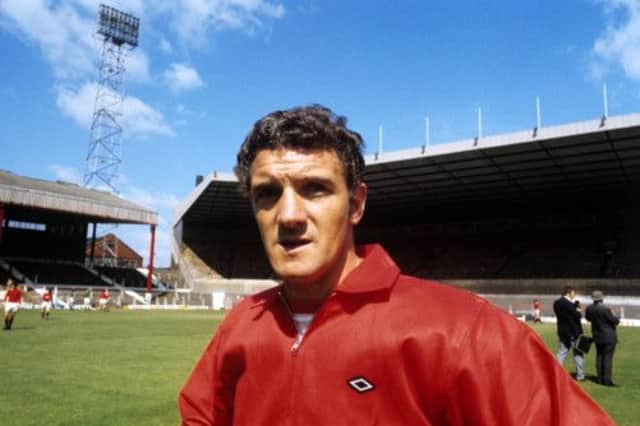Obituary: William Anthony Foulkes, footballer


As one of the Manchester United players who escaped uninjured from the Munich air disaster in 1958, and then went on to win the European Cup with the club ten years later, Bill Foulkes was one of the legends of Old Trafford.
Though not over-endowed with skill, Foulkes became one of the linchpins of both the Busby Babes and their successors in the 1950s and 60s as a tough-tackling, uncompromising centre-half.
Advertisement
Hide AdAdvertisement
Hide AdBorn in St Helens, Lancashire, Foulkes was the eldest of James and Ruth Foulkes’s three children. There was a proud sporting tradition in the family, as his grandfather was an England rugby international while his father played rugby league for St Helens.
Foulkes went down the mines immediately on leaving school, and for recreation he played for Whiston Boys Club. His fitness and physical strength, which was to be one of his great playing assets, developed at Lea Green Colliery where one of his jobs consisted of putting coal bogeys back on rails.
Spotted by a Manchester United scout, Foulkes joined the Old Trafford club at the age of 18 in March 1950. He was persuaded to turn professional a year later, but insisted on retaining his mining job – he had been promoted, and the pay was better at the pit in those days of a maximum wage for footballers.
In his autobiography, Manchester United And Beyond, Foulkes described his dual life at the time: “On a typical day I would leave my bed at 5am, then walk across the fields to reach the colliery an hour later.
“Then I would do my shift…and be up from the underground on the first winding of the cage at 2.30pm. I would shower at the pithead, snatch my football kit from my locker and catch a train from Lea Green station, arriving in Manchester at 4.30pm, though training didn’t start until 6pm.”
He made his debut for United in December, 1952, playing at right back in the first of a then record 688 games for the club. Sir Matt Busby was building the team that would become his Babes, and Foulkes was selected by the Scottish manager to lend a hard physical aspect to the play of such greats as Duncan Edwards.
Foulkes was capped only once by England, playing against Northern Ireland in 1954. He came up from Lea Green Colliery to join his teammates for the ferry over to Belfast – it was only after that cap that Foulkes though he would be good enough to play professional football full-time and he gave up mining.
He was a member of the United side that won the League Championship in season 1955-56, but lost his regular place due to National Service the following year.
Advertisement
Hide AdAdvertisement
Hide AdHe regained it the following season, and was thus on board the aircraft from Belgrade that stopped at Munich to refuel.
In the explosion that followed the BEA plane’s abortive take-off and crash, 23 people, including eight players, were killed. Foulkes was seated right at the place where the aircraft split and was thrown out onto the snow. His only injury was from a bottle of gin that fell on his head.
Of those who survived the disaster, only Sir Bobby Charlton and Harry Gregg remain alive today.
Sir Matt Busby received the Last Rites but recovered to build a new side, with Foulkes moved to centre half. He also captained United for a spell, and the addition of players such as Denis Law, George Best, and Nobby Stiles saw United become one of the greatest of English teams.
They won FA Cup in 1963, the championship in 1964-65 and again in 1966-67. Though pipped by Celtic to the honour of becoming the first British side to win the European Cup, United won the famous trophy in 1968, qualifying from a semi-final in which Foulkes’ late equaliser – one of only nine goals he scored in his career – in the Bernabeu Stadium gave United a 3-3 draw and an aggregate win.
In the final against Benfica of Portugal, he marked the great Jose Torres out of the game for long spells, and after United’s 4-1 win his first thoughts were of his lost teammates from 1958.
Foulkes rarely spoke of the disaster, though after Manchester United’s victory at Wembley he wrote: “What I do know is that this tenth year afterwards, I still think about those who went, I wonder why I escaped unhurt and the whole experience is something I have never once discussed with Matt Busby.”
His playing career ended in 1970, and he took on the job of coaching United’s youth team before managing several clubs in the USA, Norway and Japan, returning to England and retirement in 1992.
Advertisement
Hide AdAdvertisement
Hide AdAfter retiring Foulkes lived in and around Manchester and was a frequent visitor to Old Trafford.
His United medals and other mementoes were auctioned at Christie’s in October 1992, and the 20 items raised almost £35,000. His European Cup medal raised £11,000 alone, and is now in the Old Trafford Museum.
Though the family home was in Sale, Cheshire, latterly Foulkes was in a nursing home, having suffered from deteriorating mental health for some years, which, as with many footballers from his era, may have been linked to frequently heading heavy leather footballs.
Bill Foulkes is survived by Teresa, his wife for 58 years, and children Stephen, Geoff and Amanda, and his grandchildren.